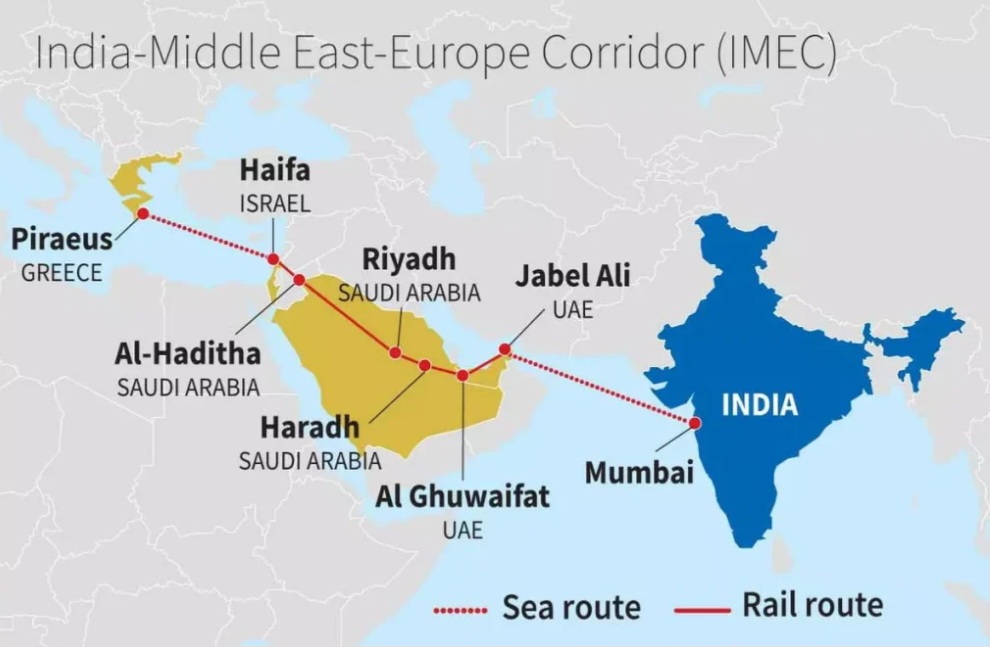By: Puloma Pal

Recently G20 summit was held in Delhi. The two-day summit went well without a glitch. As we know, the memorandum of understanding was signed and the Delhi Declaration was passed without any opposition from the member countries. Apart from this, African Union (AU) was added to G20 as a new member which now makes G20 as G21.
But currently the talk of the town is the economic corridor which was signed by G20 nation members. As per a press conference given to the media who were accompanying President of Turkey to the G20 Summit, Erdoğan clearly expressed why he is unhappy with the project. The Turkey President wants the corridor to pass through Turkey. Currently, this project consists of two corridors -The Eastern Corridor linking India to West Asia and the Middle East and The Northern Corridor linking West Asia and the Middle East with Europe. This project includes countries like India, UAE, Saudi Arabia, EU, France, Italy, Germany and the US. But theTurkish President believes that Turkey it important in terms of locations and production and is also a trade base and hence Turkey should be included in the project.
One of the line from his interview which is circulating in the media is – “No corridor without Turkey”. This line clearly states how desperate Turkey is to be the part of this Economic corridor project. What could be the possible reason? Why Turkey wants to join this project even when it is already part of Iraq Development Project as well as China’s BRI?
- The Profit – Project’s main aim is to reduce the cost of transport/shipping by 40% and save money as well as fuel. This project will not only save money and fuel but also time. Let’s take an example, if a ship takes 20 days, then after the project this time would reduce to 10 to 10 days (approx.). It is quite obvious that this project will give a direct access to Asian countries to trade with the European Union directly. Currently, the trade between Asia and EU is done through Suez Canal. This trade is about US$ 2 trillion annually.
If the corridor is completed successfully then we can say that there will be an alternative for trade. If trade begans, profit would also come in. Those countries who have partnership in this project would obviously gain a lot of profit. Hence, Turkey is too interested in the partnership and the profit. Apart from the less time to shipping goods, this corridor will have set ups of Hydrogen pipelines, high speed internet cables and electricity cables. So, this project comes with lots of investment which would bring in a lot of profit.
- China’s BRI – As we know, China’s BRI project is a huge project. It began in year 2013 and as of August 2023, 215 cooperation documents have been signed with 155 countries and 32 international organizations. This project is taking a long time. Plus, this project has a huge investment from its partner countries. China has a lot of investment across the globe. For example The China Pakistan Economic Corridor where the Chinese Govt has invested around US$ 60 billion, totally spent by China in the China-Pakistan Economic Corridor. The Government of China has continued to invest on various projecst and always been criticised on its intentions.
It is obvious that criticisms are a result of the relations between China and countries such as Cambodia, Djibouti, Mongolia and Pakistan. There are some circles that claim these countries will be drowning in Chinese debt. Hence, we can say that Turkey is looking for an alternative. The new Spice route is the best alternative for Turkey.
- An Alternative – As mentioned before, Turkey is looking for an alternative. China’s BRI is taking a long time plus Turkey doesn’t want to fall under the debt trap of China. By joining hands with India, it will not only strength countries’ security (security; as there are many powerful nations who are part of this New Spice Route). Joining the Project will also help Erdoğan polish is political image. Can we say that Turkey has now a shift in opinion and is willing to abandon China? Well! The answer to this Question can be seen in upcoming future.
The Bottom Line…
The G20 (now G21) under the Presidency of India (Bharat) has seen new changes. Some changes that people didn’t expect were the Delhi Declaration passing without a glitch, US, Russia and China the main center power countries being satisfied with the declaration, Turkey’s dissatisfaction for been left out of the corridor project and a new spice route created which would work as an alternative to China’s BRI project.
At first it was quite strange when USA didn’t protest the declaration. What reason could it be? From various reports we get to know that USA is keen to know about China and wants to dominate the south pacific region. For this USA has joined hands with South Korea which is close to Mainland China as well as Taiwan. Also, USA is not happy about the growing power of China in East and how it is channeling its routes to West Asia. Through the corridor, China’s BRI project can be side lined and India-Middle East-Europe Economic Corridor (IMEC) along with West Asia, and Europe will get an alternative of Suez Canal.
Apart from this, Turkey is already in an “intensive negotiation”with Iraq Development Road Initiative (IDRI). Iraq which is politically instable and has faced various issues in regard to state institutions as well as security. Though the instability has reduced but still the conflict of the Kurdish demonstrators in Kirkuk has disturbed the stable environment in Iraq.
With diminishing health and difficulty in walking, Erdoğan has many challenges to face during his third term of Presidency. The economic conditions are not well. The economy of Turkey has worsened especially after the massive earthquake that took away lives of many Turkish citizens. The loss is in great numbers. Turkey’s currency Lira has seen a fall after 21 years. This issue is huge as the municipal elections are around the corner and Turkey in financial crisis can make a big news in Turkey. This would further help the opposition to gain more votes. The fall of Lira is been dumped on Erdoğan and his unorthodox policy of cutting interest rates. Erdoğan’s unfavorable policy has driven away many investors.
Apart from this, there are news on how Western countries have put pressure on Turkey to accept Sweden and Finland as NATO member. The question is why Turkey opposes Sweden and Finland? Turkey believes that giving membership will be like giving membership to“terrorists”. The fight is between the Turkish forces and PKK (a Kurdish Marxist separatist movement) since the 1980s. Turkey believes that Sweden and Finland are supporting the PKK, a movement which is been classified terrorist movement not only by Turkey but also by Canada, US, European Union and Australia.
Hence, if Turkey becomes a member, it would help Erdoğan to bring foreign investments which would help the country improve their economy. This would lead to better political image of Erdoğan in his country. This would also help Erdoğan win the municipal elections which are supposed to be conducted next year in 2024.

About the Author
Puloma Pal is pursuing Master in International Relations from Amity University, Noida. She is a prolific writer whose articles are frequently published in leading geopolitical publications. She tweets at @Sassy_Saira. The views expressed are personal.


Informative
when you need all the information at same place and you are too lazy to google out. This piece is what I wanted. Thank you author.